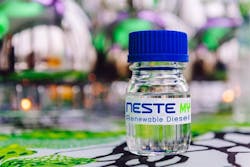New Jersey Natural Gas Reducing Fleet GHG Emissions with Neste MY Renewable Diesel
New Jersey Natural Gas (NJNG), the principal subsidiary of New Jersey Resources, is transitioning to Neste MY renewable diesel - a new, lower-emission fuel for medium-duty trucks and associated equipment - to help reduce greenhouse gas (GHG) emissions within its fleet operations.
According to Neste, the fuel is made from sustainably sourced, 100% renewable raw materials and can reduce up to 75% of GHG emissions over its life cycle compared to traditional fossil diesel. Because the fuel is drop-in and compatible with all diesel engines, NJNG won't need to build new infrastructure or modify its fleet vehicles.
“Innovation and new technologies will be critical to reduce emissions economywide and reach New Jersey’s climate goals. New Jersey Natural Gas’ use of renewable diesel to help reduce our fleet emissions is the next step toward this goal,” said Patrick Migliaccio, SVP and COO of NJNG.
Approximately 70 medium-duty trucks in NJNG’s fleet now run on Neste MY renewable diesel. The vehicles account for nearly 57,000 gallons of renewable diesel, which is estimated to reduce GHG emissions by up to 550 tons annually - equivalent to the annual direct GHG emissions from more than 120 passenger vehicles, according to the US Environmental Protection Agency (EPA) Greenhouse Gas Equivalencies Calculator.
The TOP TIER-certified renewable diesel can be used in its neat form or blended with fossil diesel at any ratio. Neste reports that the fuel also performs well in extreme cold conditions and can be stored over long periods of time without deterioration.
Neste’s distributor, Diesel Direct, and NJNG’s fuel supplier, KW Rastall Oil, are responsible for delivering the renewable diesel fuel.
“Innovative companies, like NJNG, are paving the way towards a larger-scale transition to renewables and a cleaner energy future,” said Carrie Song, SVP of Commercial Renewable Products at Neste. “This partnership demonstrates the increasing demand for lower-emission fuels across the entire nation, and we look forward to helping other businesses in the state effectively reduce greenhouse gas emissions.”
About the Author
EnergyTech Staff
Rod Walton is head of content for EnergyTech.com. He has spent 17 years covering the energy industry as a newspaper and trade journalist.
Walton formerly was energy writer and business editor at the Tulsa World. Later, he spent six years covering the electricity power sector for Pennwell and Clarion Events. He joined Endeavor and EnergyTech in November 2021.
He can be reached at [email protected].
EnergyTech is focused on the mission critical and large-scale energy users and their sustainability and resiliency goals. These include the commercial and industrial sectors, as well as the military, universities, data centers and microgrids.
Many large-scale energy users such as Fortune 500 companies, and mission-critical users such as military bases, universities, healthcare facilities, public safety and data centers, shifting their energy priorities to reach net-zero carbon goals within the coming decades. These include plans for renewable energy power purchase agreements, but also on-site resiliency projects such as microgrids, combined heat and power, rooftop solar, energy storage, digitalization and building efficiency upgrades.
